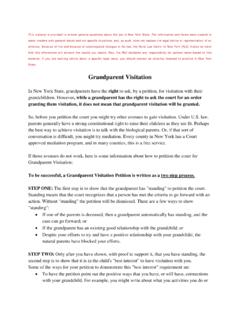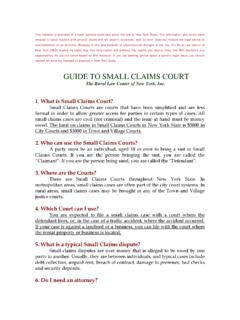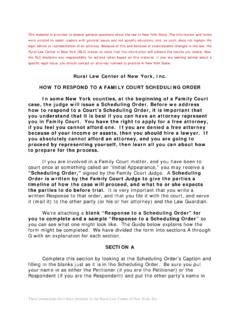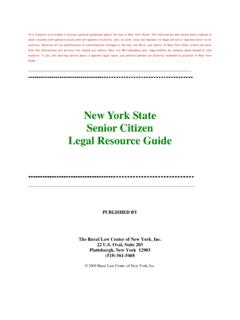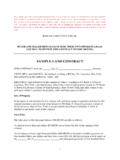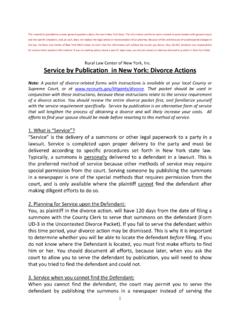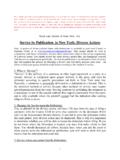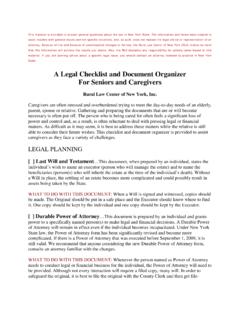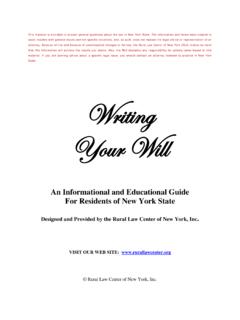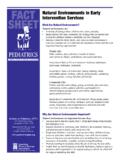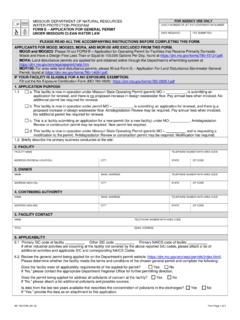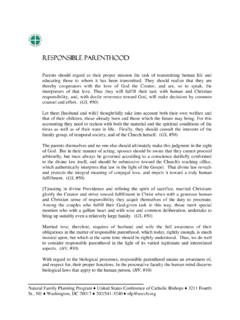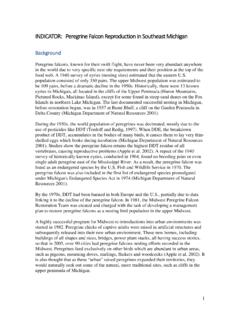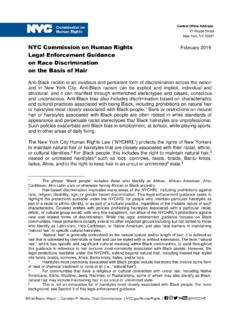Transcription of FILING FOR CHILD CUSTODY - Rural Law Center of New York
1 This material is provided to answer general questions about the law in New York State. The information and forms were created to assist readers with general issues and not specific situations, and, as such, does not replace the legal advice or representation of an attorney. Because of this and because of unanticipated changes in the law, the Rural Law Center of New York (RLC) makes no claim that this information will achieve the results you desire. Also, the RLC disclaims any responsibility for actions taken based on this material. If you are seeking advice about a specific legal issue, you should contact an attorney licensed to practice in New York State.
2 FILING FOR CHILD CUSTODY . WHEN YOU ARE. NOT THE NATURAL PARENT. A GUIDE FOR NEW YORK STATE RESIDENTS FROM. THE Rural LAW Center OF NEW YORK, INC. 1. What do I need to do first? If you are not the natural parent (that is, a biological or adoptive mother or father) of a CHILD in New York State AND you have not been granted joint CUSTODY prior to this in any court, then you must show in your petition, that there are extraordinary circumstances. 2. What does the term extraordinary circumstances mean? Extraordinary circumstances may exist if a parent has abandoned the CHILD or if the parent is currently unfit to care for the CHILD .
3 The judge may also consider how long the CHILD and parent have lived separately, the current relationship between the CHILD and the parent, and the reasons why the parent does not currently have CUSTODY . For further information regarding your specific case, it is recommended you consult with an attorney. 3. What happens if the court determines that extraordinary circumstances do not exist? Your petition will be dismissed. 4. What happens if the court determines that extraordinary circumstances do exist? If you are successful in proving that extraordinary circumstances exist, then you must show that CUSTODY being granted to you would be in the CHILD 's best interests.
4 5. What does best interests mean? In CUSTODY cases there is no firm definition of best interests. Rather, for each case, the court will consider a number of factors such as: a) Who has been the primary caregiver? b) Need for stability and continuity in the CHILD 's life. c) Relative financial ability of the caregivers d) Quality of the home environment and the parental guidance each caregiver provides. e) Ability to provide for the CHILD 's emotional and intellectual development. f) Relative fitness of each prospective caregiver. g) Length of time the present custodial arrangement has been in effect.
5 H) Desires of the CHILD . 6. What information do I need to have before I fill out the petition? You need to gather these facts BEFORE you complete the CUSTODY petition because this information will guide you to the correct form to use. You need to know: a) Name, address, phone number and social security number of each parent. b) Name, date of birth, and social security number of the CHILD . c) Name of person who has physical CUSTODY of the CHILD . d) If there are any other petitions for CUSTODY or visitation of the CHILD , and if so, the date, the court, and the results of the case.
6 If there are CUSTODY orders that have been issued by the courts regarding the CHILD , then you must use the form entitled PETITION FOR. MODIFICATION OF CUSTODY . If there are not any prior CUSTODY orders, then you should use the form entitled PETITION GFOR. CUSTODY . e) Are the natural parents married, divorced, or legally separated? If so, then include the date of each event that applies to each natural parent. f) Do you have any knowledge of any Temporary or Permanent Orders of Protection issued against either natural parent? Are there any Temporary or Permanent Orders of Protection issued against you?
7 If available, please specify the court, the index number, the date of the order, status of the case, and whether there are any upcoming court dates. g) Do you have any knowledge of any pending criminal domestic violence cases against either natural parent? If so, there is a possibility that the CHILD CUSTODY case could be transferred by the courts to the integrated domestic violence court in your county. As of October 2006, there are integrated domestic violence courts in Clinton, Essex, and Franklin counties. 7. Do I need to have the petition notarized? Yes. You must sign your petition in the presence of a notary.
8 8. Is there a fee for FILING my petition? No, there is no cost to file the file with the Family Court. 9. What happens after I file my petition? You and all the other parties to the case will be notified by the court of the first court appearance date. Since you filed the petition, you are the Petitioner . The parties you filed against are the Respondents . From the date the respondents receive the petition, they will have 20. days to file their response to your petition with the court. does serving the petition mean? It means that a copy of your petition must be delivered to the respondents.
9 If the Department of Social Services is involved, they must also be served with a copy of the petition. 11. What do I need to know about going to court? Always be on time. Appearance matters, so wear your most professional outfit. Be polite to all involved, that is, the court personnel, the attorneys, and caseworkers. Remember to speak clearly and loudly enough for all to hear you. ALWAYS. follow the judge's orders. 12. How can I prepare for my case? 1) KEEP A JOURNAL. Your CUSTODY journal is a daily record of events which impact the children's'. lives, and reflect upon your abilities as a caregiver.
10 This journal should be kept on a daily basis, both so that you do not forget important events and so that you are not later accused of erasing events which may or may not have occurred. List both routine and special events which take place on any given day. While routine items such as preparation of a meal may not seem important at first, when viewed as part of a long-term pattern of care, they take on great significance. Be as detailed as you like. For example, your description of a meal's preparation might include a menu to show that the CHILD receives nutritional meals as well as a description of the CHILD 's role at mealtime when they help set or clear the table, or fix the salad or dessert.
